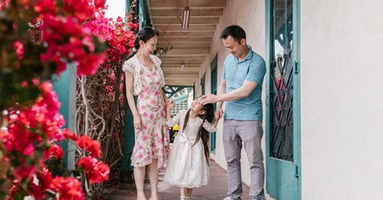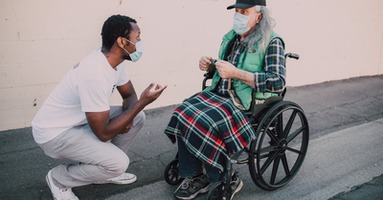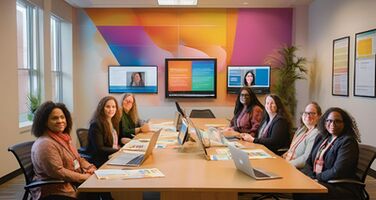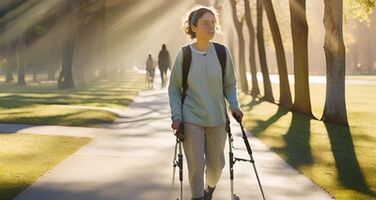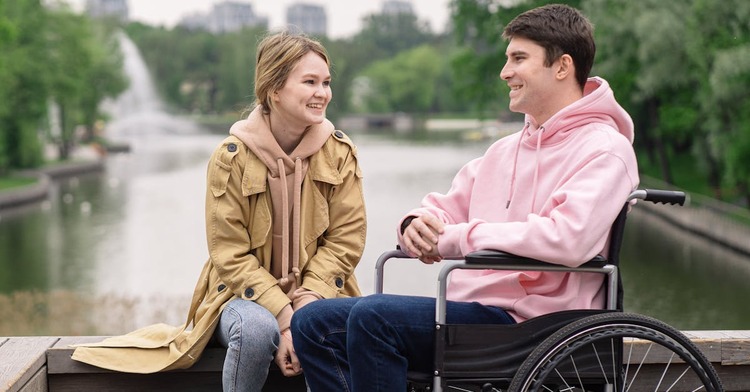
Major Disabled Advocacy Groups
The landscape of disability advocacy in the United States is rich with organizations dedicated to protecting and advancing the rights of individuals with disabilities. These groups play crucial roles in ensuring that people with disabilities can live independent, fulfilling lives, free from discrimination and systemic barriers. Here, we highlight some of the major disabled advocacy groups, each contributing uniquely to the cause.
1. American Association of People with Disabilities (AAPD)
The American Association of People with Disabilities (AAPD) is a national cross-disability rights organization that works to improve the lives of people with disabilities. Founded in 1995, AAPD aims to increase the political and economic power of people with disabilities through advocacy, policy, and program initiatives. The organization focuses on a variety of issues, including employment, education, healthcare, and accessibility, working to ensure that people with disabilities can live, learn, work, and participate fully in society.
AAPD also provides various resources and opportunities for people with disabilities, such as the Disability Rights Storytellers Fellowship and the NBCUniversal Tony Coelho Media Scholarship. These initiatives are designed to empower individuals with disabilities by providing them with platforms to share their stories and pursue educational opportunities. AAPD does not directly assist with obtaining disabled permits, but it does advocate for policies that improve accessibility and mobility for people with disabilities.
Website: AAPD
2. Disability Rights Education and Defense Fund (DREDF)
The Disability Rights Education and Defense Fund (DREDF) is a leading national civil rights law and policy center dedicated to protecting and advancing the rights of people with disabilities. Founded in 1979 and based in Berkeley, California, DREDF engages in legal advocacy, legislative development, and education to ensure the full inclusion of people with disabilities in all aspects of society. The organization has been instrumental in the development and implementation of major disability rights legislation, including the Americans with Disabilities Act (ADA) and the Individuals with Disabilities Education Act (IDEA).
DREDF provides legal representation, technical assistance, and training to individuals, advocates, and policymakers on disability rights issues. While DREDF does not directly handle the issuance of disabled permits, its advocacy work has significantly contributed to the creation of more inclusive and accessible public spaces, transportation systems, and services for people with disabilities.
Website: DREDF
3. National Disability Rights Network (NDRN)
The National Disability Rights Network (NDRN) is a nonprofit organization that serves as the national network for the federally mandated Protection and Advocacy (P&A) systems and Client Assistance Programs (CAP) for individuals with disabilities. Founded in 1982, NDRN provides training, technical assistance, and legal support to its member organizations, which operate in every U.S. state and territory. These member organizations advocate for the rights of individuals with disabilities and work to ensure that they have access to education, employment, healthcare, and other essential services.
NDRN and its member organizations provide a wide range of services, including individual advocacy, legal representation, and public policy advocacy. While NDRN does not directly issue disabled permits, its member organizations often assist individuals in navigating the application process for various disability-related services, including obtaining disabled parking permits.
Website: NDRN
4. The Arc
The Arc is the largest national community-based organization advocating for and serving people with intellectual and developmental disabilities (IDD) and their families. Founded in 1950, The Arc provides a wide range of services, including advocacy, education, employment support, and residential services. The organization has over 600 state and local chapters across the United States, working to promote and protect the human rights of people with IDD and support their full inclusion in the community.
The Arc offers various programs and initiatives, such as the National Center on Criminal Justice and Disability (NCCJD) and the Center for Future Planning, which provide resources and support to individuals with IDD and their families. While The Arc does not specifically handle the issuance of disabled permits, many of its local chapters provide assistance and guidance to individuals and families seeking access to disability-related services and accommodations.
Website: The Arc
5. National Federation of the Blind (NFB)
The National Federation of the Blind (NFB) is the largest and most influential organization of blind people in the United States. Founded in 1940, NFB works to improve the lives of blind individuals through advocacy, education, research, and technology. The organization aims to ensure that blind people have equal access to opportunities and can live independent and fulfilling lives. NFB's initiatives include the NFB-NEWSLINE, a free audio news service for the blind, and the NFB BELL Academy, which provides educational programs for blind children.
NFB also advocates for policies and legislation that promote the rights and inclusion of blind individuals, such as accessible technology and transportation. While NFB does not directly issue disabled permits, it provides resources and support to blind individuals seeking to obtain accommodations and services, including accessible parking permits.
Website: NFB
6. Autistic Self Advocacy Network (ASAN)
The Autistic Self Advocacy Network (ASAN) is a nonprofit organization run by and for autistic people. Founded in 2006, ASAN advocates for the rights and inclusion of autistic individuals and works to ensure that their voices are heard in policy discussions that affect their lives. ASAN's work includes public policy advocacy, community organizing, and the development of resources and training programs to promote self-advocacy and inclusion.
ASAN's initiatives focus on various issues, including healthcare, education, employment, and accessibility. The organization also provides support and resources to autistic individuals and their families. While ASAN does not directly assist with obtaining disabled permits, it advocates for policies that promote accessibility and inclusion for autistic individuals, including access to disability-related services and accommodations.
Website: ASAN
7. United Spinal Association
The United Spinal Association is a national nonprofit organization dedicated to improving the quality of life for people with spinal cord injuries and disorders (SCI/D). Founded in 1946, the organization provides a wide range of services, including advocacy, education, and peer support. United Spinal's mission is to empower individuals with SCI/D to achieve their highest level of independence and quality of life.
The organization offers various programs and resources, such as the New Beginning Backpack, which provides essential information and supplies to newly injured individuals, and the VetsFirst program, which advocates for the rights and benefits of veterans with disabilities. United Spinal also provides assistance with accessibility issues, including the application process for disabled parking permits and other accommodations.
Website: United Spinal Association
8. National Association of the Deaf (NAD)
The National Association of the Deaf (NAD) is the oldest and largest civil rights organization in the United States dedicated to advocating for the rights of deaf and hard-of-hearing individuals. Founded in 1880, NAD works to promote equal access to education, employment, healthcare, and other essential services. The organization also provides legal advocacy, public policy advocacy, and community outreach programs to support the deaf and hard-of-hearing community.
NAD's initiatives include the Youth Leadership Camp, the Junior NAD program, and the NAD Law and Advocacy Center, which provides legal representation and advocacy on issues affecting the deaf community. While NAD does not directly handle the issuance of disabled permits, it provides resources and support to individuals seeking access to disability-related services and accommodations, including accessible parking permits.
Website: NAD
9. Paralyzed Veterans of America (PVA)
Paralyzed Veterans of America (PVA) is a nonprofit organization that serves veterans with spinal cord injuries or disorders (SCI/D). Founded in 1946, PVA provides a wide range of services, including advocacy, employment assistance, research, and adaptive sports programs. The organization's mission is to improve the quality of life for veterans with SCI/D and ensure they receive the benefits and services they deserve.
PVA's initiatives include the Veterans Career Program, the National Veterans Wheelchair Games, and the PVA Research Foundation, which funds research on SCI/D. The organization also provides assistance with accessibility issues, including the application process for disabled parking permits and other accommodations for veterans with disabilities.
Website: PVA
10. National Council on Independent Living (NCIL)
The National Council on Independent Living (NCIL) is a national membership organization that advocates for the rights and full inclusion of people with disabilities. Founded in 1982, NCIL represents Centers for Independent Living (CILs) and Statewide Independent Living Councils (SILCs) across the United States. The organization works to ensure that people with disabilities have access to the services and supports they need to live independently and participate fully in their communities.
NCIL's initiatives focus on various issues, including healthcare, employment, housing, and transportation. The organization also provides training, technical assistance, and advocacy resources to its members. While NCIL does not directly issue disabled permits, many CILs provide assistance and guidance to individuals seeking access to disability-related services, including obtaining disabled parking permits.
Website: NCIL
11. Cerebral Palsy Foundation (CPF)
The Cerebral Palsy Foundation (CPF) is a nonprofit organization dedicated to improving the lives of individuals with cerebral palsy (CP) through research, innovation, and collaboration. Founded in 1949, CPF works to advance medical research, improve healthcare practices, and promote public awareness about CP. The organization partners with leading medical institutions, researchers, and advocates to drive progress and improve outcomes for individuals with CP.
CPF's initiatives include the CP NOW initiative, which provides resources and support to individuals with CP and their families, and the Transforming Healthcare for Women with Disabilities initiative, which addresses healthcare disparities faced by women with disabilities. While CPF does not directly handle the issuance of disabled permits, it provides resources and support to individuals seeking access to disability-related services and accommodations.
Website: CPF
12. Muscular Dystrophy Association (MDA)
The Muscular Dystrophy Association (MDA) is a nonprofit organization dedicated to finding treatments and cures for muscular dystrophy, ALS, and related neuromuscular diseases. Founded in 1950, MDA provides a wide range of services, including medical care, research funding, and support programs for individuals and families affected by neuromuscular diseases. The organization's mission is to transform the lives of people with these conditions through innovative research, care, and support.
MDA's initiatives include the MDA Care Center Network, which provides comprehensive medical care to individuals with neuromuscular diseases, and the MDA Summer Camp, which offers a free, week-long camp experience for children with neuromuscular diseases. While MDA does not directly issue disabled permits, it provides resources and support to individuals seeking access to disability-related services and accommodations.
Website: MDA
13. Easterseals
Easterseals is a nonprofit organization that provides a wide range of services to individuals with disabilities and their families. Founded in 1919, Easterseals offers programs and services that address the needs of individuals with disabilities at every stage of life, including early intervention, education, employment, and senior services. The organization's mission is to ensure that individuals with disabilities have equal opportunities to live, learn, work, and play in their communities.
Easterseals' initiatives include the Easterseals Disability Film Challenge, which promotes awareness and inclusion of people with disabilities in the entertainment industry, and the Easterseals Workforce Development Program, which provides employment support and training to individuals with disabilities. While Easterseals does not directly handle the issuance of disabled permits, many of its local affiliates provide assistance and guidance to individuals seeking access to disability-related services and accommodations.
Website: Easterseals
14. National Multiple Sclerosis Society (NMSS)
The National Multiple Sclerosis Society (NMSS) is a nonprofit organization dedicated to improving the lives of individuals with multiple sclerosis (MS) through research, advocacy, and support services. Founded in 1946, NMSS funds cutting-edge research, provides comprehensive support services, and advocates for policies that benefit people with MS. The organization's mission is to help individuals with MS live their best lives while working towards a world free of MS.
NMSS' initiatives include the MS Navigator program, which provides personalized support and resources to individuals with MS, and the Walk MS and Bike MS events, which raise funds for MS research and support services. While NMSS does not directly issue disabled permits, it provides resources and support to individuals seeking access to disability-related services and accommodations, including accessible parking permits.
Website: NMSS
15. National Alliance on Mental Illness (NAMI)
The National Alliance on Mental Illness (NAMI) is the largest grassroots mental health organization in the United States, dedicated to improving the lives of individuals affected by mental illness through advocacy, education, support, and public awareness. Founded in 1979, NAMI provides a wide range of programs and services, including support groups, educational courses, and public policy advocacy. The organization's mission is to ensure that individuals with mental illness have access to the resources and support they need to lead fulfilling lives.
NAMI's initiatives include the NAMI Family-to-Family program, which provides education and support to family members of individuals with mental illness, and the NAMI Peer-to-Peer program, which offers peer-led education and support to individuals with mental illness. While NAMI does not directly handle the issuance of disabled permits, it provides resources and support to individuals seeking access to disability-related services and accommodations.
Website: NAMI
16. Amputee Coalition
The Amputee Coalition is a national nonprofit organization dedicated to improving the lives of individuals living with limb loss and limb difference through education, support, and advocacy. Founded in 1986, the Amputee Coalition provides a wide range of services, including peer support, educational resources, and public policy advocacy. The organization's mission is to ensure that individuals with limb loss have access to the resources and support they need to live independently and thrive.
The Amputee Coalition's initiatives include the National Limb Loss Resource Center, which provides information and resources to individuals with limb loss, and the Peer Support Program, which connects individuals with trained peer mentors. While the Amputee Coalition does not directly issue disabled permits, it provides resources and support to individuals seeking access to disability-related services and accommodations, including accessible parking permits.
Website: Amputee Coalition
17. Christopher & Dana Reeve Foundation
The Christopher & Dana Reeve Foundation is a nonprofit organization dedicated to curing spinal cord injury by advancing innovative research and improving the quality of life for individuals living with paralysis. Founded in 1999, the Reeve Foundation provides funding for research, support services, and advocacy initiatives. The organization's mission is to cure spinal cord injury and improve the health and well-being of individuals living with paralysis.
The Reeve Foundation's initiatives include the Paralysis Resource Center, which provides information and support to individuals living with paralysis, and the NeuroRecovery Network, which offers specialized rehabilitation programs for individuals with spinal cord injury. While the Reeve Foundation does not directly issue disabled permits, it provides resources and support to individuals seeking access to disability-related services and accommodations, including accessible parking permits.
Website: Reeve Foundation
18. Hearing Loss Association of America (HLAA)
The Hearing Loss Association of America (HLAA) is a national nonprofit organization dedicated to improving the lives of individuals with hearing loss through advocacy, education, support, and public awareness. Founded in 1979, HLAA provides a wide range of programs and services, including support groups, educational resources, and public policy advocacy. The organization's mission is to ensure that individuals with hearing loss have access to the resources and support they need to lead fulfilling lives.
HLAA's initiatives include the Walk4Hearing event, which raises funds and awareness for hearing loss, and the Hearing Loss Support Specialist Training Program, which provides training and certification for individuals who provide support to those with hearing loss. While HLAA does not directly handle the issuance of disabled permits, it provides resources and support to individuals seeking access to disability-related services and accommodations.
Website: HLAA
19. Spina Bifida Association (SBA)
The Spina Bifida Association (SBA) is a national nonprofit organization dedicated to improving the lives of individuals affected by spina bifida through education, advocacy, research, and support services. Founded in 1973, SBA provides a wide range of programs and services, including educational resources, support groups, and public policy advocacy. The organization's mission is to ensure that individuals with spina bifida have access to the resources and support they need to lead fulfilling lives.
SBA's initiatives include the Spina Bifida Resource Network, which provides information and support to individuals and families affected by spina bifida, and the Walk-N-Roll for Spina Bifida event, which raises funds and awareness for spina bifida. While SBA does not directly issue disabled permits, it provides resources and support to individuals seeking access to disability-related services and accommodations, including accessible parking permits.
Website: SBA
20. National Organization on Disability (NOD)
The National Organization on Disability (NOD) is a nonprofit organization that promotes the full inclusion of people with disabilities in all aspects of life, including employment, education, and community participation. Founded in 1982, NOD focuses on increasing employment opportunities for people with disabilities through research, advocacy, and partnership with employers. The organization's mission is to ensure that people with disabilities have equal access to opportunities and can participate fully in society.
NOD's initiatives include the Disability Employment Tracker, which helps employers assess their disability inclusion practices, and the Look Closer campaign, which raises awareness about the benefits of hiring people with disabilities. While NOD does not directly issue disabled permits, it provides resources and support to individuals seeking access to disability-related services and accommodations.
Website: NOD
These organizations represent a broad spectrum of advocacy and support services for individuals with disabilities, each contributing in unique ways to improve accessibility, inclusion, and quality of life. While not all of them provide direct assistance with obtaining disabled permits, they all offer valuable resources and support for individuals navigating various aspects of living with a disability.
.png)

